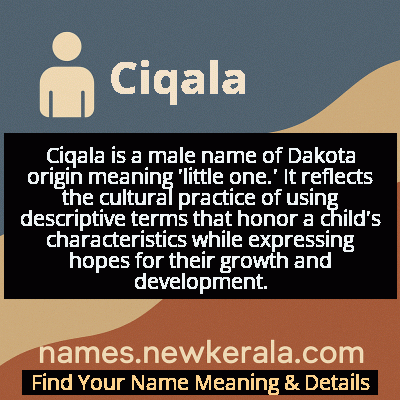Ciqala Name Meaning & Details
Origin, Popularity, Numerology Analysis & Name Meaning of Ciqala
Discover the origin, meaning, and cultural significance of the name CIQALA. Delve into its historical roots and explore the lasting impact it has had on communities and traditions.
Name
Ciqala
Gender
Male
Origin
American
Lucky Number
7
Meaning of the Name - Ciqala
Ciqala is a male name of Dakota origin meaning 'little one.' It reflects the cultural practice of using descriptive terms that honor a child's characteristics while expressing hopes for their growth and development.
Ciqala - Complete Numerology Analysis
Your Numerology Number
Based on Pythagorean Numerology System
Ruling Planet
Neptune (Ketu)
Positive Nature
Intuitive, analytical, spiritual, and inquisitive.
Negative Traits
Secretive, reserved, aloof, and can be overly critical.
Lucky Colours
Green, yellow.
Lucky Days
Monday.
Lucky Stones
Cat’s eye, moonstone.
Harmony Numbers
1, 5, 6.
Best Suited Professions
Scientists, researchers, spiritual leaders, detectives.
What People Like About You
Depth of knowledge, analytical skills, spirituality.
Famous People Named Ciqala
Ciqala Little Bear
Dakota Elder and Cultural Preservationist
Documented and preserved traditional Dakota language and stories
Ciqala Red Cloud
Lakota Activist and Educator
Founded educational programs for Native youth in South Dakota
Ciqala White Eagle
Artist and Storyteller
Created contemporary art blending traditional Dakota symbols with modern mediums
Name Variations & International Equivalents
Click on blue names to explore their detailed meanings. Gray names with will be available soon.
Cultural & Historical Significance
Historically, Dakota naming traditions were closely tied to family and community identity, with names often changing throughout a person's life to reflect their experiences and achievements. Ciqala as a name demonstrates the Dakota practice of using descriptive terms that honor the natural characteristics of a child while also expressing hopes for their future. The continued use of this name today represents cultural resilience and the ongoing preservation of Dakota language and traditions despite historical challenges and assimilation pressures.
Extended Personality Analysis
Individuals named Ciqala are often perceived as possessing a gentle strength and quiet determination. They tend to be observant and thoughtful, taking time to understand situations before acting, which can make them excellent problem-solvers and mediators. Despite the name's meaning of 'little one,' many Ciqalas demonstrate remarkable resilience and inner fortitude, often surprising others with their capability and depth. They typically value close relationships and community bonds, showing loyalty and dedication to those they care about. Their humble nature often masks a strong will and creative spirit, making them individuals who grow into their potential gradually but impressively.
Ciqalas often exhibit a natural curiosity and learning orientation, combined with practical wisdom that serves them well in various life situations. They tend to be patient and methodical in their approach to challenges, preferring to build solid foundations rather than seeking quick solutions. Many develop strong intuitive abilities and emotional intelligence, allowing them to connect deeply with others and understand complex social dynamics. While they may start quietly, Ciqalas often become respected leaders in their communities through their consistent reliability, thoughtful counsel, and ability to see the bigger picture while attending to important details.
Modern Usage & Popularity
In contemporary times, Ciqala has seen a resurgence among Dakota and Lakota families seeking to preserve their linguistic and cultural heritage. While not common in mainstream American naming trends, it holds significant importance within Native communities as part of cultural revitalization efforts. The name is increasingly used by parents who want to honor their ancestry while giving their children a meaningful identity rooted in indigenous language. Some non-Native families interested in unique, nature-inspired names have also adopted Ciqala, though this practice is often accompanied by discussions about cultural appropriation. The name remains relatively rare in national databases but shows steady usage within specific cultural contexts and regions with significant Dakota populations, particularly in Minnesota, North Dakota, South Dakota, and Montana where cultural preservation efforts are strongest.
Symbolic & Spiritual Meanings
Symbolically, Ciqala represents the concept of potential and growth from small beginnings. It embodies the idea that greatness often starts humbly, much like a seed that contains within it the promise of a mighty tree. The name carries metaphors of nurturing, protection, and the sacred responsibility of caring for what is young and vulnerable. In a broader spiritual sense, Ciqala symbolizes the journey of personal development and the transformation that occurs through careful cultivation and patience. It reminds us that small things hold immense value and that true strength often comes in unassuming packages. The name also represents cultural continuity and the passing of traditions from one generation to the next, ensuring that cultural knowledge and identity are preserved and cherished despite external pressures and changing times.

